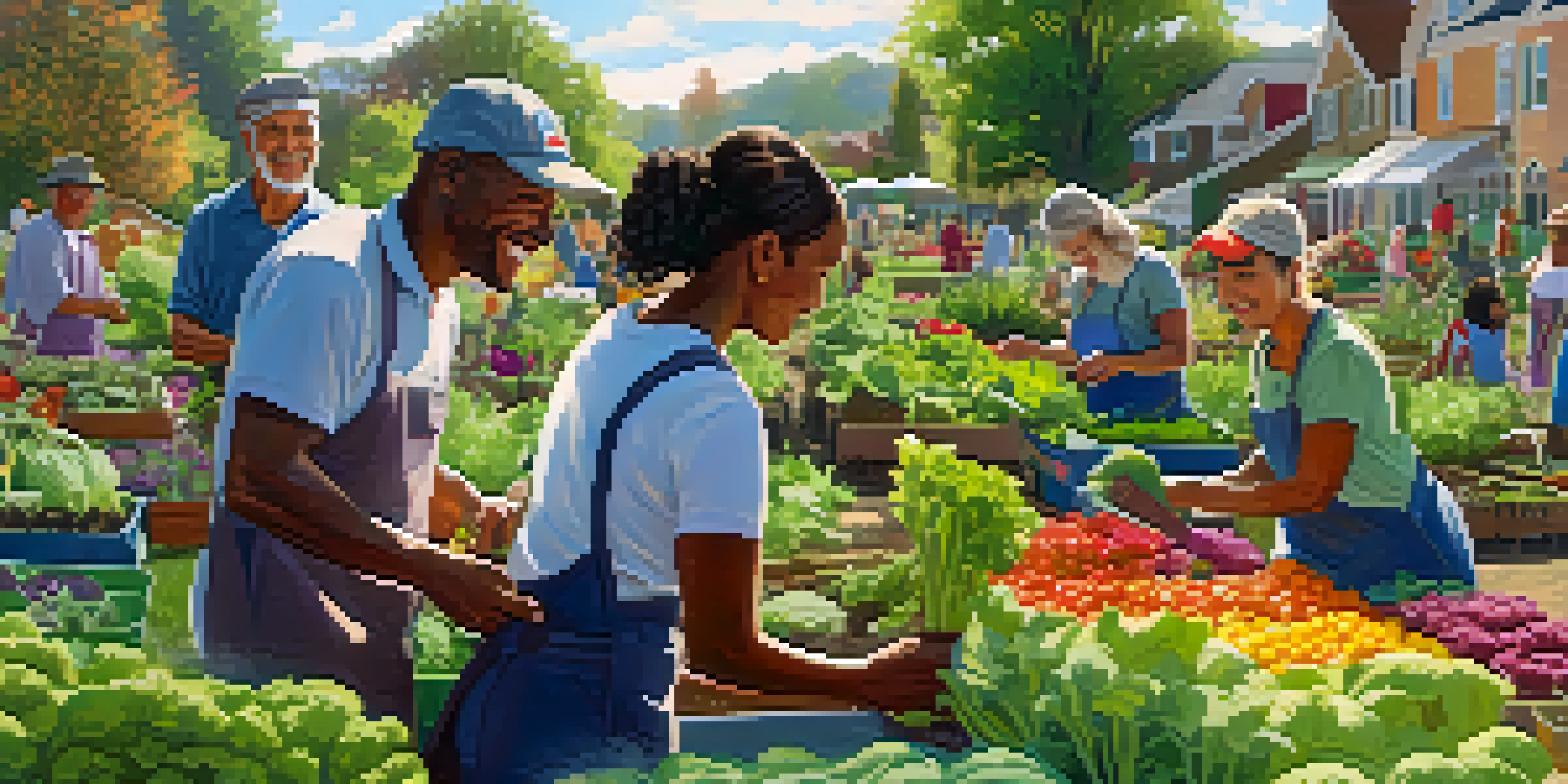Addressing Food Insecurity Through Community Cooperation

Understanding Food Insecurity: A Growing Concern
Food insecurity is a pressing issue that affects millions worldwide. It refers to the lack of reliable access to sufficient quantities of affordable and nutritious food. This situation can lead to various health problems and negatively impact individuals' overall well-being.
Food security is a fundamental human right, and it is a responsibility of society to ensure that everyone has access to it.
The causes of food insecurity are complex and multifaceted, including economic instability, unemployment, and systemic inequalities. As communities become more aware of this issue, the need for cooperative solutions grows stronger. Understanding the root causes is essential for developing effective strategies to combat food insecurity.
By recognizing food insecurity as a community issue rather than an individual one, we can foster a sense of collective responsibility. This approach encourages community members to support one another, paving the way for collaborative initiatives that address the problem at its core.
The Role of Community Cooperation in Addressing Food Needs
Community cooperation is crucial in addressing food insecurity effectively. When individuals and organizations come together, they can pool resources, knowledge, and skills to create sustainable solutions. This cooperative spirit can manifest in various forms, from food drives to community gardens.

Working together not only maximizes resources but also fosters a sense of belonging and solidarity among community members. For example, local farmers can collaborate with food banks to distribute fresh produce to those in need. Such partnerships can lead to more nutritious food options for vulnerable populations.
Community Cooperation is Key
By pooling resources and skills, communities can create sustainable solutions to address food insecurity.
Moreover, community cooperation can enhance food distribution systems, making them more efficient and effective. By sharing information and coordinating efforts, communities can ensure that food reaches those who need it most, ultimately reducing food waste and improving access.
Building Community Gardens: Growing Food and Connections
Community gardens are a fantastic example of how cooperation can address food insecurity. These shared spaces allow individuals to cultivate their own food while building relationships with their neighbors. Gardening together creates a sense of ownership and pride in the local community.
The best way to find yourself is to lose yourself in the service of others.
In addition to providing fresh produce, community gardens can serve as educational hubs. Workshops on gardening techniques, nutrition, and cooking can empower participants with valuable skills. This knowledge transfer enables individuals to become more self-sufficient and aware of their food choices.
Furthermore, community gardens can help bridge gaps between diverse populations. They can bring together people from various backgrounds, fostering understanding and collaboration. This inclusivity is vital for creating a resilient community that can tackle food insecurity collectively.
Food Banks: The Power of Local Initiatives
Food banks play a crucial role in alleviating food insecurity, providing immediate relief to those in need. These organizations rely heavily on community support, from donations to volunteers. By working together, communities can ensure that food banks are stocked and ready to serve.
Local initiatives, such as 'food rescue' programs, are becoming increasingly popular. These programs involve collecting surplus food from restaurants and grocery stores to distribute to food banks and shelters. This not only helps feed those in need but also reduces food waste, creating a more sustainable food system.
Education Empowers Change
Raising awareness about food insecurity through education fosters community engagement and action.
Moreover, food banks can evolve to provide more than just emergency food supplies. They can offer resources like job training and financial planning workshops, addressing the root causes of food insecurity. By taking a holistic approach, food banks can empower individuals and families to achieve long-term stability.
Education and Awareness: Key to Combatting Food Insecurity
Raising awareness about food insecurity is essential for fostering community cooperation. When community members understand the challenges faced by their neighbors, they are more likely to take action. Educational campaigns can highlight the importance of healthy eating and food access.
Schools and local organizations can partner to create programs that teach children and adults about nutrition and food preparation. Involving families in these initiatives not only empowers them but also builds a stronger community bond. Knowledge is a powerful tool against food insecurity.
Additionally, social media can play a significant role in spreading awareness and mobilizing support. Engaging content can inspire others to participate in local initiatives, whether through volunteering, donating, or advocating for policy changes. Together, we can create a culture of compassion and cooperation.
Policy Changes: Advocating for Community Food Solutions
While grassroots efforts are vital, advocating for policy changes is equally important. Communities can work together to push for local and national policies that address food insecurity. This can include increased funding for food programs, improved access to affordable housing, and better wages for workers.
Engaging with local government representatives can amplify community voices. By organizing meetings or campaigns, residents can highlight their needs and propose solutions. Cooperation among community members can lead to a stronger advocacy impact, making it harder for decision-makers to ignore the issue.
Policy Advocacy Drives Impact
Advocating for policy changes is essential for creating long-term solutions to food insecurity at both local and national levels.
Moreover, collaboration with local businesses can foster a supportive environment for food security initiatives. Businesses can contribute by offering discounts to food banks or participating in local food drives. These partnerships can create a ripple effect, encouraging others to get involved and support the cause.
Success Stories: Communities Making a Difference
Across the globe, there are inspiring examples of communities coming together to combat food insecurity. From urban farming initiatives in cities to rural cooperative markets, these endeavors demonstrate the power of collaboration. These success stories serve as a reminder that change is possible when we work together.
For instance, a community in a food desert established a mobile market to bring fresh produce directly to residents. This initiative not only improved access to healthy food but also strengthened community ties. Such projects highlight how innovative solutions can emerge from cooperation and creativity.

Sharing success stories can inspire other communities to take action. By showcasing what has worked elsewhere, we can encourage more collaborative efforts. Ultimately, these stories remind us that when communities unite, they can create lasting change and address food insecurity effectively.